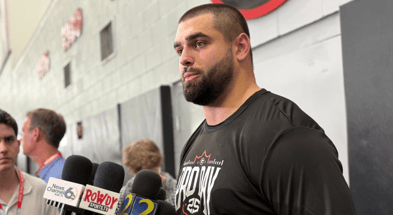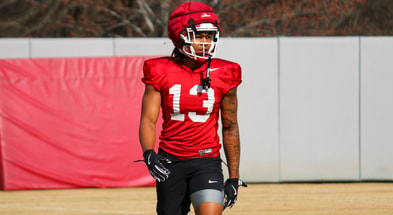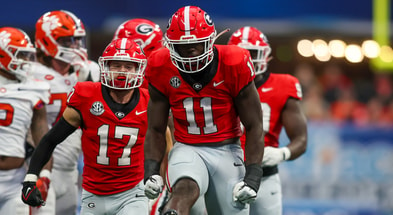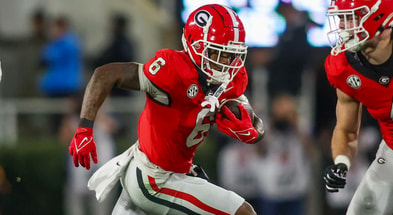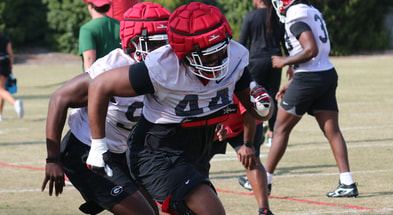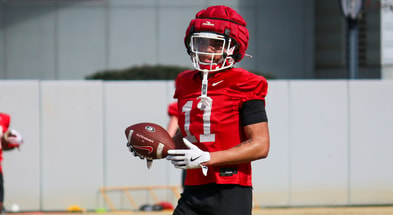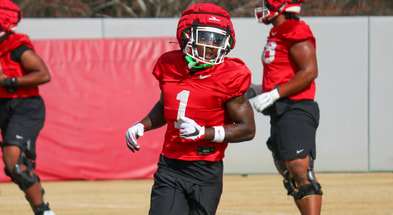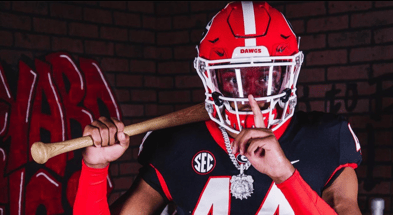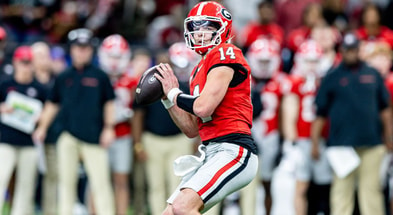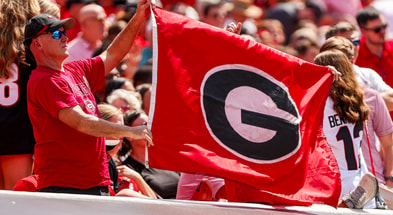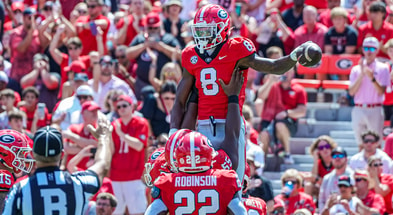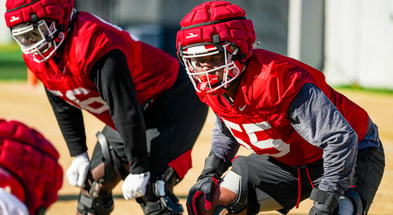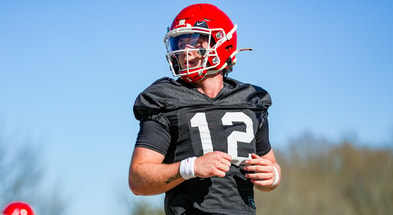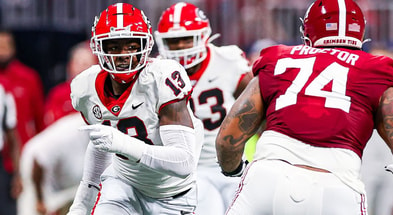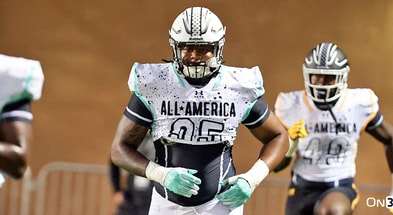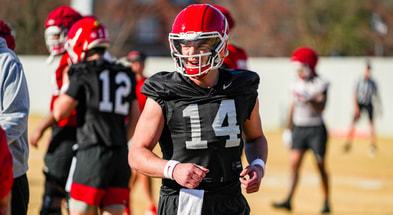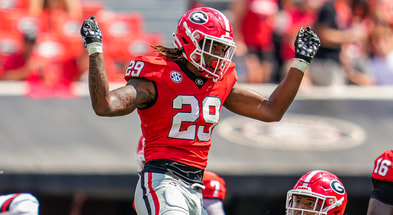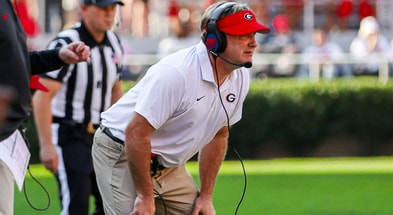Depth of pass catchers not a problem for Georgia entering 2022
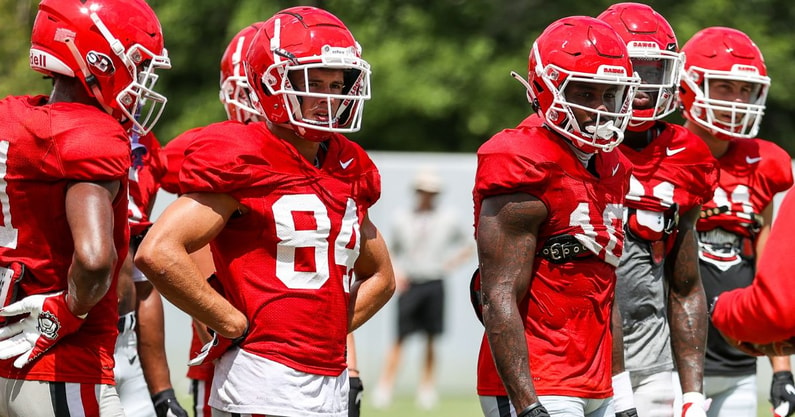
Georgia has a unique set of pass catchers on its roster and a unique approach to using them. From running backs getting the ball out of the backfield to the idea of four tight ends being on the field at the same time, anything is possible if you’re Georgia offensive coordinator Todd Monken. And then of course on top of that there’s the players you’d expect to catch the most passes, the wide receivers.
Still, having so many weapons can create for some head scratching circumstances offensively. How can there be so many talented players and yet only a single 1,000 yard receiver in school history?
Monken says he understands that thinking and the mindset of skill players but also gets that every offense is different.
“I get skill players. I’ve coached them all my life. If you’re in basketball you want to score, if you’re in baseball you want to hit, and if you’re a skill guy you want to touch the football. I get that, and I understand certain skill guys frustrations when they don’t. That’s their value,” Monken said. “When is was at Oklahoma State in 2011, Justin Blackmon won the Biletnikoff. We had like seven kids with hundreds of yards. Then the next year we had Josh Stewart who had a 1,000 yards. They were different offenses, more air raid like, and some may have had a few more games.”
“I’m going to compare it to one thing because I find it very intriguing. It’s easy to pick on. No matter which way you go, I found this in the NFL. You create this with quarterbacks where the touchdown to interception ratio exists. Yet everybody knows if you get in the red zone, your best red zone team is more able to run the football in. How does that make any sense?,” he explained. “If you’re really good at running and you run for touchdowns, and you have the quarterback only throwing for 17 touchdowns with 10 picks, well you could’ve had 10 more you just didn’t need him to. It is what it is. The idea is for us, and it’s frustrating for our players, is to score as much as we can, be explosive, and utilize the skill sets we have. We get in the red zone and score touchdowns regardless if we throw or run it. The rest of it is the talk, not really in terms of the value of what it really means. I get what you are saying, I really do. You would love to have someone you can count, too. We had to be really creative last year with who that is. Is it Brock (Bowers)? Is it AD (Mitchell)? My last year at Southern Miss, we had a 4,000 yard passer and two 1,000 yard rushers, so that’s elite. You would love to have that, but sometimes it just doesn’t work itself out that way.”
Monken also said that if he had to guess, Georgia would have had its coveted 1,000 yard receiver last year if George Pickens had been able to play in all 15 games. Pickens caught a team-high 49 passes for 727 yards and eight touchdowns as a freshman in 2019. He returned the next year to average 64.1 yards per game in a Monken offense. Over the course of 15 games, that comes up just short of the 1,000-yard mark, but would have at least had the Bulldogs in contention to cross that threshold, especially if he played the way he did at the end of the 2020 season throughout the 2021 year.
Top 10
- 1New
Paul Finebaum
Beats down Danny Kanell
- 2Trending
Dick Vitale
Predicts Final Four, champs
- 3
Brad Brownell
Clemson HC finalizing extension
- 4Hot
Jay Bilas
Reveals his bracket, upsets
- 5
EA Sports CFB 26
Doubles pay to players in appearing in game
Get the On3 Top 10 to your inbox every morning
By clicking "Subscribe to Newsletter", I agree to On3's Privacy Notice, Terms, and use of my personal information described therein.
Georgia might not have to wait much longer though with the kind of talent of this year’s team.
Last year’s leading receiver Brock Bowers is back after a freshman year that saw him haul in 56 passes for 882 yards and 13 touchdowns, all single-season records for a tight end at Georgia and the most receiving touchdowns in a season regardless of position. Add in 6-foot-7 Darnell Washington, a dynamic threat in Arik Gilbert and others in that tight end room, and there’s zero doubt that Georgia has one of the most talented position groups in the country coached by Todd Hartley.
“Well, if you run it too often, you get every wideout in the portal (laughing),” Monken said about the possibility of running four tight end sets. “We do have great players at that position. You do have to utilize their skillset, but you also have to balance that because there is a cost to that. It is one thing to say we are going to utilize 13 personnel, 14 personnel, then it is like ‘Ok, what are we going to do out of it to execute?’ That is probably the toughest thing is how do you get through practice and execute how you want it to look once you get to the game. That happens a lot in offense and defense meetings, where a defensive coach will say ‘Boy, that really gives us problems.’ It only gives you problems if we can execute. If it gives us problems as well, it is really not worth anything. We do have good players there. We do have to find a good way to get them on the field and use all of our talented players.”
Of course the tight ends aren’t the only options when it comes to pass catchers, and guys like Ladd McConkey, Adonai Mitchell, Kearis Jackson and even some of the running backs that caught passes out of the backfield are still around.
“Well, we lost George (Pickens) last year. Maybe in some ways that made us better, you know. In some ways once George went down we had to figure ‘OK, we don’t have an X, we don’t have someone you can just go three by one and they kick their coverage and we can throw it there,’ So, you have to get into more tightened sets, condensed sets. How are we going to run the ball better? How are we going to use our tight ends? Not knowing exactly at the time what we had in Brock Bowers or A.D. Mitchell or whoever,” Monken said. “At the end of the day, you figuring out the puzzle is probably the No. 1 thing we are paid to do is, and no one really cares who you have. We do have more options at receiver probably at some spots, but at the end of the day whether it is using our backs, using our tight ends, using our receivers — it is what you are paid to do. Figure out a way to score and not turn it over.”




